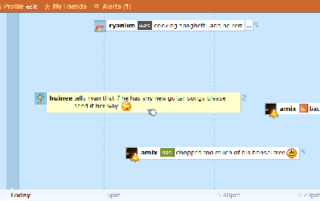
Jaiku was a social networking, micro-blogging and lifestreaming service comparable to Twitter, founded a month before the latter. Jaiku was founded in February 2006 by Jyri Engeström and Petteri Koponen from Finland and launched in July of that year. It was purchased by Google on October 9, 2007.
HCL Connections is a Web 2.0 enterprise social software application developed originally by IBM and acquired by HCL Technologies in July 2019. Connections is an enterprise-collaboration platform which aims to helps teams work more efficiently. Connections is part of HCL collaboration suite which also includes Notes / Domino, Sametime, Portal and Connections.
Microblogging is a form of blogging using short posts without titles known as microposts. Microblogs "allow users to exchange small elements of content such as short sentences, individual images, or video links", which may be the major reason for their popularity. Some popular social networks such as Twitter, Mastodon, Tumblr, Koo, and Instagram can be viewed as collections of microblogs.
Twitterrific was a macOS and iOS client for the social networking site Twitter created by The Iconfactory and was the first Twitter desktop client to come to macOS. It lets users view "tweets" or micro-blog posts on the Twitter website in real time as well as publish their own. Twitterrific is closed source software.

GNU social is a free and open source software microblogging server written in PHP that implements the OStatus standard for interoperation between installations. While offering functionality similar to Twitter, GNU social seeks to provide the potential for open, inter-service, and distributed communications between microblogging communities. Enterprises and individuals can install and control their own services and data.

Plurk is a free social networking and micro-blogging service that allows users to send updates through short messages or links, which can be up to 360 text characters in length.
The tables below compare general and technical information for some notable active microblogging services, and also social network services that have status updates.
Tencent Weibo was a Chinese microblogging (weibo) website launched by Tencent in April 2010, and was shut down on September 28, 2020. Users could broadcast a message including 140 Chinese characters at most through the web, SMS or smartphone.

Diaspora is a nonprofit, user-owned, distributed social network. It consists of a group of independently owned nodes which interoperate to form the network. The social network is not owned by any one person or entity, keeping it from being subject to corporate take-overs or advertising. According to its developer, "our distributed design means no big corporation will ever control Diaspora."
Reblogging is the mechanism in blogging which allows users to repost the content of another user's post with an indication that the source of the post is another user.

OStatus is an open standard for federated microblogging, allowing users on one website to send and receive status updates with users on another website. The standard describes how a suite of open protocols, including Atom, Activity Streams, WebSub, Salmon, and WebFinger, can be used together, which enables different microblogging server implementations to route status updates between their users back-and-forth, in near real-time.

A brand page, in online social networking parlance, is a profile on a social networking website which is considered distinct from an actual user profile in that it is created and managed by at least one other registered user as a representation of a non-personal online identity. This feature is most used to represent the brands of organizations associated with, properties owned by, or general interests favored by a user of the hosting network.

Friendica is a free and open-source software distributed social network. It forms one part of the Fediverse, an interconnected and decentralized network of independently operated servers.

Twister is a decentralised, experimental peer-to-peer microblogging program. The system uses end-to-end encryption to safeguard communications. It is based on both BitTorrent- and Bitcoin-like protocols and has been likened to a distributed version of Twitter.

IndieWeb is a community of people building software to enable personal, independently hosted websites to independently maintain their social data on their own web domains rather than on large, centralized social networking services. First developed at a series of conferences known as IndieWebCamp by Tantek Çelik, Amber Case, Aaron Parecki, Crystal Beasley and Kevin Marks, it uses a suite of tools including Webmention and microformats in order to decentralize social communication and distribution of content.

Mastodon is a free and open-source software for running self-hosted social networking services. It has microblogging features similar to Twitter, which are offered by a large number of independently run nodes, known as instances or servers, each with its own code of conduct, terms of service, privacy policy, privacy options, and content moderation policies.

The fediverse is an ensemble of social networks, which, while independently hosted, can communicate with each other. ActivityPub, a W3C standard, is the most widely used protocol that powers the fediverse. Users on different websites can send and receive updates from others across the network. Noted fediverse platforms include Mastodon, Lemmy, PeerTube, and Pixelfed.

ActivityPub is an open, decentralized social networking protocol based on Pump.io's ActivityPump protocol. It provides a client/server API for creating, updating, and deleting content, as well as a federated server-to-server API for delivering notifications and content.
IndieAuth is an open standard decentralized authentication protocol that uses OAuth 2.0 and enables services to verify the identity of a user represented by a URL, as well as to obtain an access token, that can be used to access resources under the control of the user.
JSON Feed is a Web feed file format for Web syndication in JSON instead of XML as used by RSS and Atom.











